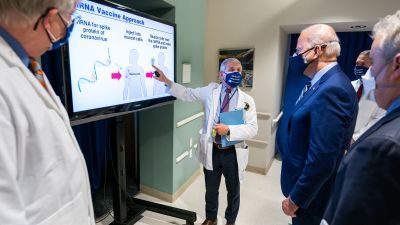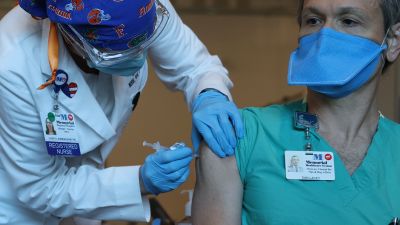
AIDS quilt in Washington, DC,, July 22,2012. . (Photo by Elvert Barnes/ flickr CC 2.0)
In some areas of the South, more than a quarter of gay and bisexual men are living with HIV, and because of lack of access to health care insurance and other services, that number is rising. Those startling statistics come from a new study by Emory University, which reported that new infection rates are highest among the poor and most vulnerable populations. Add to that a New York Times Magazine cover story earlier this month that pointed out America’s “black gay and bisexual men have a higher HIV rate than any other country in the world.”
Recent moves by the Trump administration don’t bode well for an improvement in those numbers anytime soon.The New York Times reports:
Soon after President Trump’s inauguration, the web page of the Office of National AIDS Policy, the architect of the National HIV/AIDS Strategy, was disabled on the White House website. The president’s proposed budget includes a $186 million cut in the CDC’s funding for HIV/AIDS prevention, testing and support services. The congressional fight over the repeal of the Affordable Care Act, and the president’s declarations that “Obamacare is dead,” have conjured a disastrous return to even more alarming conditions, like waiting lists for medication. As recently as 2011, the AIDS Drug Assistance Program state-by-state list of people waiting for HIV medication ballooned to over 9,000 people, mostly poor black and brown men in Southern states.
Meanwhile, experts estimate that President Trump’s proposed funding cuts to AIDS prevention and treatment programs in sub-Saharan Africa and elsewhere mean that over 1 million people will die overseas.
This week HIV expert Scott A. Schoettes took to the opinion pages of Newsweek to announce his and five colleagues departure from the Presidential Advisory Council on HIV/AIDS (PACHA). They wrote:
We have dedicated our lives to combating this disease and no longer feel we can do so effectively within the confines of an advisory body to a president who simply does not care. The Trump administration has no strategy to address the ongoing HIV/AIDS epidemic, seeks zero input from experts to formulate HIV policy, and — most concerning — pushes legislation that will harm people living with HIV and halt or reverse important gains made in the fight against this disease.
One reason for their departure was essentially there was no “there” there. The Trump administration has indeed taken down the website for the council (you can see what it looked like in the Obama era here) and has not filled the post of director of the White House Office of National AIDS policy. That position had a seat on the domestic policy council under President Obama. One of the council members reported to Buzzfeed that it felt as if their meetings had been relocated to a storage room. The White House responded saying that the domestic policy council have met with HIV/AIDS representatives several times.
But it was more than benign neglect that led Schoettes and his colleagues to resign. It was the president’s plans for health care reform and especially the proposed rollback on Medicaid expansion.
People living with HIV know how broken the pre-ACA system was. Those without employer-based insurance were priced out of the market because of pre-existing condition exclusions. And “high risk pools” simply segregated people living with HIV and other health conditions into expensive plans with inferior coverage and underfunded subsidies—subsidies advocates had to fight for tooth-and-nail in every budgetary session.
Because more than 40 percent of people with HIV receive care through Medicaid, proposed cuts to that program would be extremely harmful. Prior to Medicaid expansion under ACA, a person had to be both very low income and disabled to be eligible for Medicaid.
For people living with HIV, that usually meant an AIDS diagnosis—making the disease more difficult and expensive to bring under control—before becoming eligible.
Between reinstating that paradox by defunding Medicaid expansion, imposing per-person caps on benefits, and/or block granting the program, the changes to Medicaid contemplated by the American Health Care Act would be particularly devastating for people living with HIV.
Read the full statement by the six and additional reporting from The New York Times and NBC.
Read more installments in our series “While He was Tweeting” — keeping an eye on Trump’s wrecking ball.



